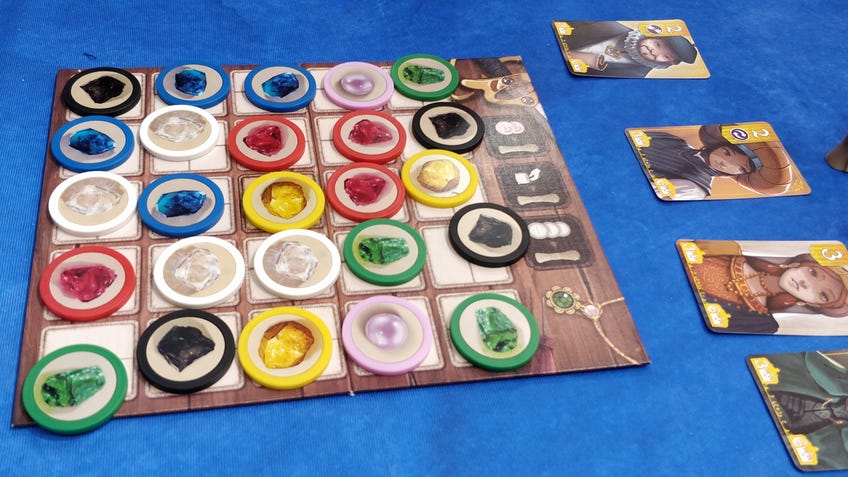Splendor Duel is a two-player game that’s harder, meaner and better than the original: Essen Spiel 2022 preview
Quite a pearl.
Announced earlier this year, Splendor Duel is one of several two-player variants of popular board games that are set to arrive in the near future. Alongside the recently revealed Wingspan Asia – an expansion that doubles as a board game for two players, that Dicebreaker also managed to play at the Essen Spiel 2022 tabletop gaming convention – Splendor Duel looks to adapt the gameplay of a fairly straightforward title to fit a head-to-head format. Whilst both Wingspan and Splendor support smaller player-counts, their two-player variants provide an experience tailored to the more intimate nature that a one-on-one playthrough provides.
Standard Splendor typically flows at a leisurely pace, with players moving between smaller objectives as and when they take their fancy. By contrast, Splendor Duel is an intense battle of intellect and luck, requiring each player to carefully consider their options on every single turn. The upcoming board game employs a range of devious tactics to bait players into screwing each other over, transforming the once laid-back jewel trading title into an aggressive match of cunning and meanness. Which is exactly what a good two-player variant should do.
The main gameplay of Splendor Duel remains much the same as the original’s, with players competing by acquiring victory points from various cards found in the game. Players still pick up and use jewel tokens to gain cards, with the more point-heavy cards requiring a larger number of jewels to be acquired, however, that’s where the similarities between Splendor Duel and its predecessor end. Whilst the original restricts the number of jewels players can take depending on whether they match – you can take either two of the same or three of different types – Splendor Duel enforces restrictions in other, more challenging ways.
If players are slow to adapt to the availability of jewel tokens, they’ll quickly find themselves slipping behind.
All the available jewel tokens players can take on their turn are laid out on a board that is filled in an order indicated via a spiraling arrow that begins in the very middle. Jewels are selected randomly from a felt bag, before being placed along the spiral until the board is completely full. Players must take their desired jewels from this board in a specific manner – choosing a total of three jewels in a line that is either vertical, horizontal or diagonal. As in the original Splendor, players can only take one gold jewel at a time, alongside reserving a card to purchase, meaning that acquiring the jewel tokens you want is a lot trickier this time around.

Where tokens are placed on the board is entirely random, meaning a player’s initial strategy can be entirely thrown off by an errant gold jewel being in the way of the line of tokens a player wants to take. This means that players will have to switch strategies or simply wait until the board is refilled once again – which, whilst being a free action, also gives your opponent more options as well as yourself. If players are slow to adapt to the availability of jewel tokens, they’ll quickly find themselves slipping behind their opponent, which is a fatal error in Splendor Duel.
Perhaps the ability that best exemplifies the personality of Splendor Duel is the ability to steal a token from your opponent.
More options will open up to players as they gain more cards, many of which feature permanent jewel upgrades that can be used to acquire expensive cards or simply speed up the process of getting the lower-level ones. Momentum has always been an important aspect of Splendor, but even more so with its two-player game. Flowing from card to card enables players to better construct their jewel-churning engine, which consequently allows them to overcome any obstacles produced by jewel scarcity or the layout of the board.
However, Splendor Duel cleverly forces even the most card-rich players to interact with the board through the use of a brand-new jewel type. As with gold jewels, pearls cannot be found on any of the cards in the game, meaning that they can only be acquired through the board. They may not be restricted in the same way as gold jewels – players can pick them up as part of a group of three – but many of the higher-scoring cards require them, meaning that players will still need to plan around the board if they want to win.
People who thrive on the competitiveness of two-player titles will definitely not find Splendor Duel wanting.
Luckily for them, the addition of privilege tokens allows players to take a token of their choice from the board as an optional action. Privilege tokens can be acquired by purchasing certain cards or whenever your opponent fills the board and are valuable resources for navigating the fickle luck of token placement. Cards can have other abilities as well – which are new to the family board game series – such as allowing players to take another turn or gain a token of their choice. Perhaps the one that best exemplifies the personality of Splendor Duel is the ability to steal a token from your opponent, which has the potential to thoroughly ruin their current strategy and potentially your friendship.

The vicious nature of Splendor Duel is a marker for its success however, with the two-player game embodying everything that makes a head-to-head experience so unique and enjoyable. Players who like Splendor for its accessibility may not take to Splendor Duel as well, though it certainly isn’t a complicated game to learn. But people who thrive on the competitiveness of two-player titles will definitely not find Splendor Duel wanting.
Splendor Duel will be available in the UK next month.


